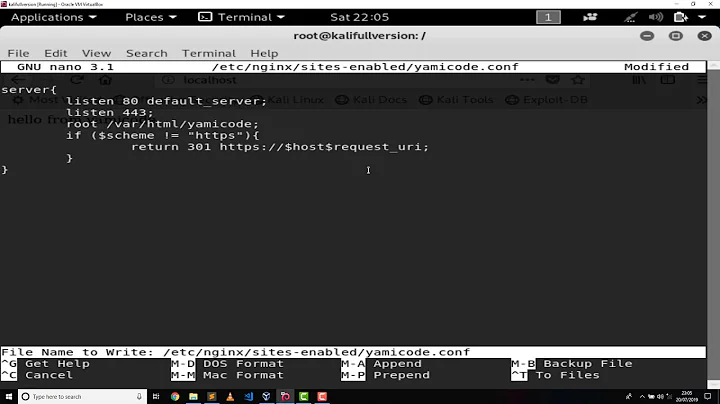how to issue a relative url redirect from nginx?
Solution 1
nginx header filter always inserts <scheme>://<host> if return uri starts with /.
(see ngx_http_script_return_code() and ngx_http_header_filter() function in nginx source for reference)
So, if client (e.g. google chrome) can accept Location: /qwerty, you can use the following configure:
location = /b {
return 301 " /qwerty"; # insert space char before "/qwerty"
}
Another solution can generate Location: /qwerty exactly, via lua-nginx-module and add_header directive:
location = /b {
add_header Location "/qwerty";
content_by_lua 'ngx.exit(301)';
}
How does this weird configure work?
- use
ngx.exitto exit with status code with 301, it does not create "Location" header (returndirective always create "Location" header, even empty header value) - use
add_headerto addLocation: /qwertyheader, it does not insert<scheme>://<host>
Solution 2
There is an nginx directive absolute_redirect available from nginx version 1.11.8, which is enabled by default. If disabled, redirects issued by nginx will be relative. This issue is a bit older, but maybe useful for all of you hitting it from google.
absolute_redirect off;
Related videos on Youtube
dan moore
Updated on September 19, 2022Comments
-
dan moore over 1 year
How can a redirect be configured in nginx to respond to a certain url with a relative redirect to a specific path?
The nginx documentation suggests that this is the default mode for nginx, but in reality if the location being redirected to starts with a / nginx is responding with an absolute url in the Location field.
For local server configuration containing locations:
location = /a { return 301 some/path; } location = /b { return 301 /qwerty; }the response Location to a request to /a is:
Location: some/pathand for /b it is:
Location: http://127.0.0.1/qwertyhowever, we would like /b to respond with:
Location: /qwertyThe reason we would like to use relative redirects is that we would like to access nginx from different domains and proxies, e.g. in clear in dev or via ssl-terminating load-balancer, and would rather keep things simple by relieving nginx of needing to understand that context.
FYI these examples were tested against nginx versions 1.4.6 and 1.9.6, using curl e.g.:
curl --head http://127.0.0.1/b -
Rafał Krypa about 7 yearsNice trick with a space in "return" directive. Is this behavior of nginx documented anywhere?
-
Trevor Freeman over 6 yearsThat space trick is hilarious and awesome, how did you discover it?
-
xiaochen over 6 yearshi @TrevorFreeman , RFC 2616 allows "space trick" actually. In chapter "4.2 Message Headers", the header value is defined as
field-value = *( field-content | LWS ).*LWSmeans zero or manylinear white space. -
chrkv over 6 years@xiaochen RFC 2616 is obsolete for 3 years. RFC 7231 now allows relative redirects tools.ietf.org/html/rfc7231
-
Santhosh about 4 yearsThis is simplest and perfect solution, but I had to check it in a private browser window to confirm that Location header is relative. Regular browser window still shows the absolute Location header due to caching behaviour.
-
JJ Roman over 3 yearsadd_header solution is significantly slower
![[Webserver-administration-P8] Nginx - Hướng dẫn cấu hình nginx làm reverse proxy (Phần 1)](https://i.ytimg.com/vi/i-WkwYbCvcY/hqdefault.jpg?sqp=-oaymwEcCOADEI4CSFXyq4qpAw4IARUAAIhCGAFwAcABBg==&rs=AOn4CLCEHJ1xiVn0f9BL-XTkcazMbwDVVQ)






